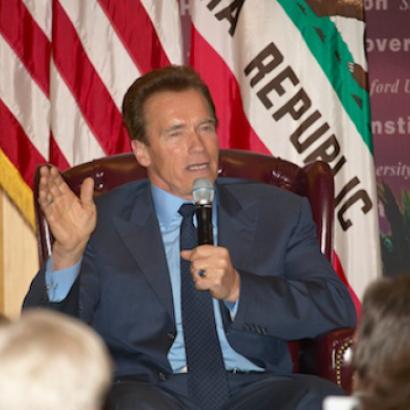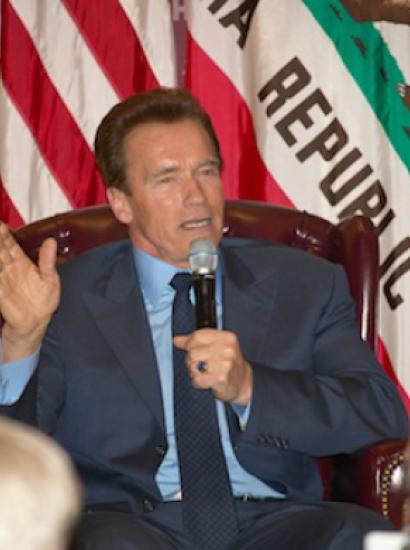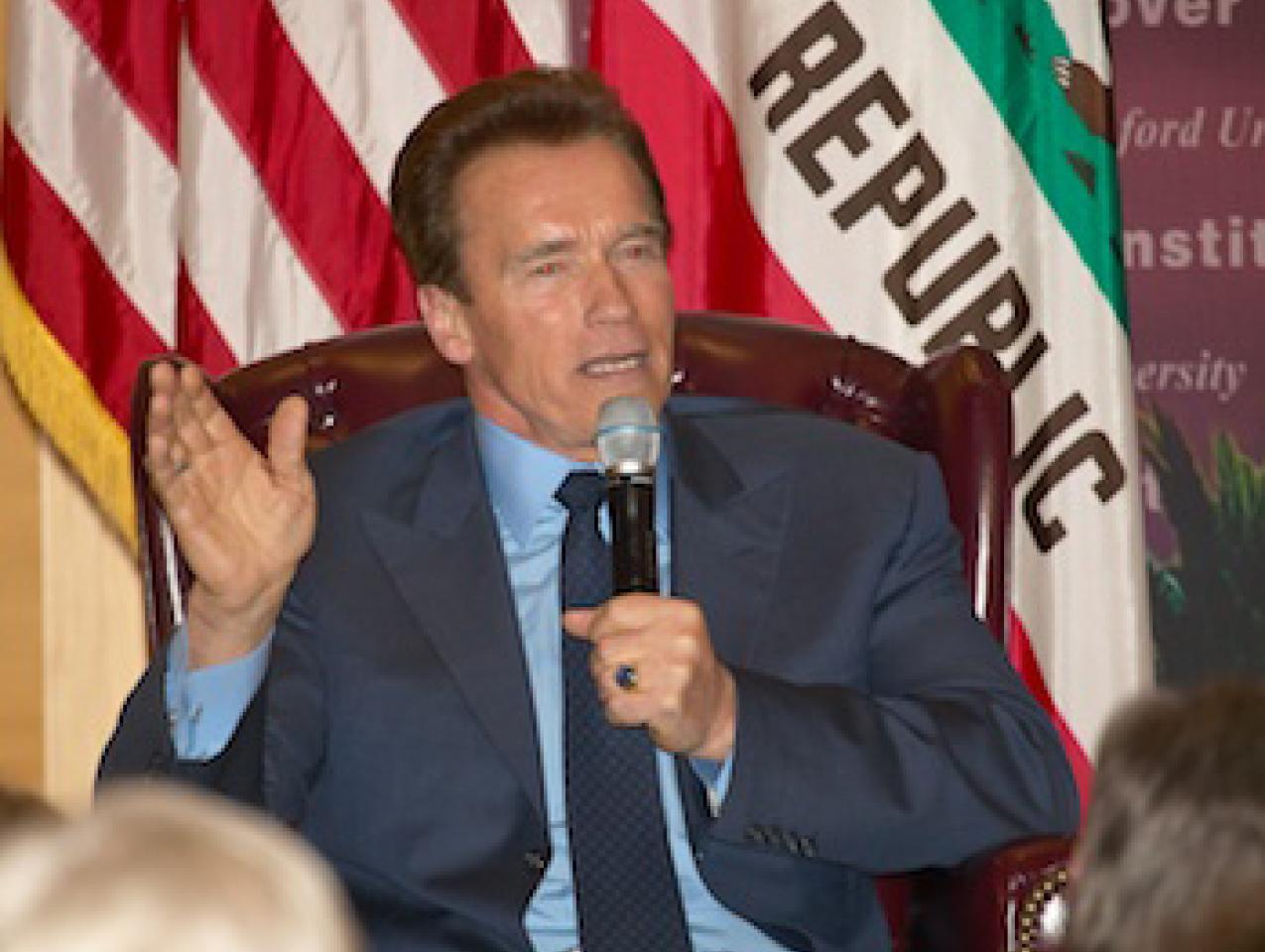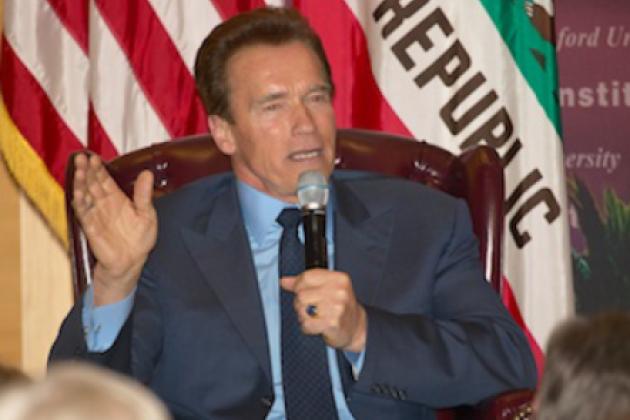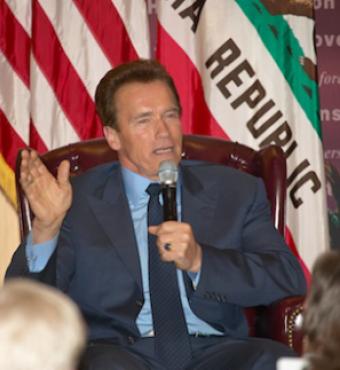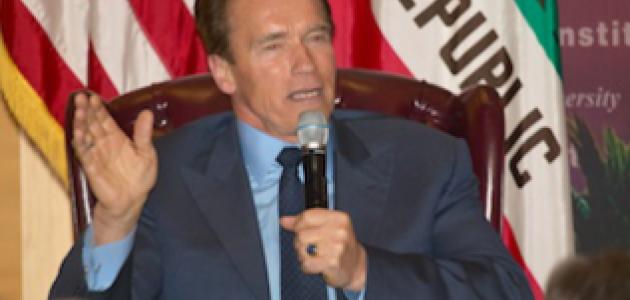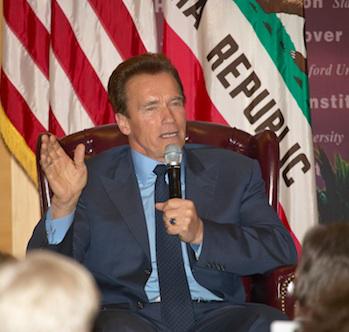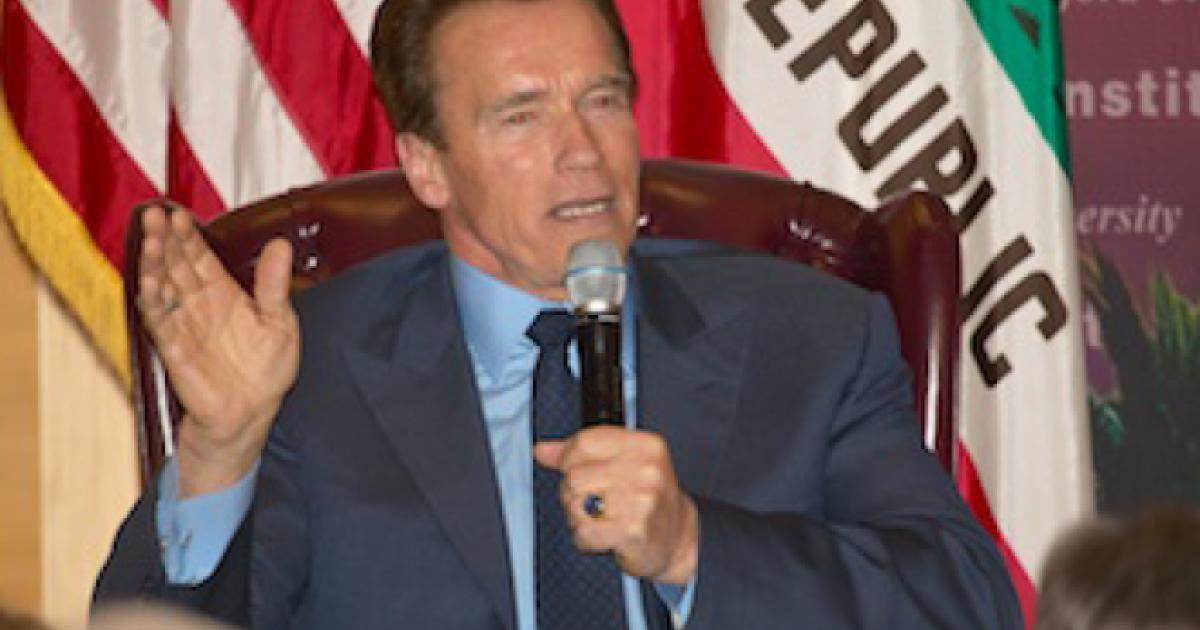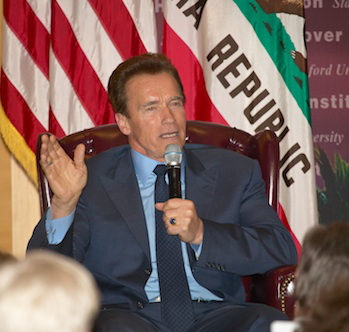
Key energy issues that could be favorably influenced by effective public policies at the state, local, and federal level were discussed at a conference hosted by the Hoover Institution’s Shultz-Stephenson Task Force on Energy on January 19 and 20.
The conference, “Evaluating America’s Energy Policies One Year into the Obama Administration,” brought together leading experts in energy-related fields to assess current policies and address available energy resources and their under development. As part of the conference, California governor Arnold Schwarzenegger joined George P. Shultz, former secretary of state and the Thomas W. and Susan B. Ford Distinguished Fellow at the Hoover Institution, for a conversation about energy policy and other related topics at a dinner on Tuesday, January 19.
Shultz, the chair of the Shultz-Stephenson Task Force, and Burton Richter, the former director of the SLAC National Accelerator Laboratory and a task force member, opened the conference with a conversation on major trends in energy development, noting the importance of energy and the controversy around it that leaves many confused about the topic. “The economy has prospered due to inexpensive, secure sources of energy,” said Shultz.
Issues discussed included those defined as legacy issues, including distributed energy, energy efficiency, and the nuclear fuel cycle, and others viewed as emerging issues, including synthetic biology, carbon pricing, research and development policy, and international relationships.
“Energy touches just about everything we do,” said R. James Woolsey, energy task force member and former director of the Central Intelligence Agency, in his remarks on distributed energy, which seeks to avoid the vulnerabilities of long-distance power lines. In reviewing energy policy Woolsey pointed out that there are two energy systems, electricity and transportation, to contend with in developing new policy. He called for updating the outdated U.S. electrical grid system by moving away from coal to distributed energy sources, including solar and natural gas, and moving away from oil dependency by developing transportation that uses electricity. James Boyd, vice chair of the California Energy Commission, who moderated the session, and Dan Reicher, director, of Climate and Energy Initiatives at Google.org, the discussant, called for a mix of technology, policy, and finance to solve many of our energy problems by 2030.
Hoover senior fellow James Sweeney, in his talk on how to boost energy efficiency, said, “Multiple responses to a multiplicity of problems will be required.” Sweeney, also an energy task force member, is director of the Precourt Institute for Energy Efficiency at Stanford University.
Ellen Tauscher, U.S. undersecretary of state for arms control and international security, discussed the future of the nuclear fuel cycle. She cited the nonproliferation and commercial benefits of using interim sites for used fuel and of offering to take back used fuel from countries’ operating nuclear reactors. The session was moderated by Robert Rosner, a distinguished service professor of physics and astronomy and astrophysics at the University of Chicago, a visiting professor at the Center for International Security and Cooperation at Stanford, and the former director of Argonne National Laboratory. The discussant was Tom Isaacs, consulting professor at the Center for International Security and Cooperation at Stanford and the director of Planning and Special Studies at Lawrence Livermore National Laboratory. Isaccs strongly supported the interim storage idea, in addition to efforts to find solutions to disposing of spent fuel.
Calling it a “major game-changer,” Craig Venter discussed the contribution of synthetic biology to energy needs. Panelists for the session included Jay Keasling, a professor of chemical engineering and bioengineering at the University of California at Berkeley, and Drew Endy, the president of BioBricks Foundation and an assistant professor of bioengineering at Stanford. The session moderator was Paul Berg, professor emeritus, Stanford University, and energy task force member. Topics covered included the need for more research and development support, the problem of scaling-up small processes to very large ones, and safety issues.
The question of whether the United States should opt for a revenue-neutral carbon tax or cap and trade in its future climate policy was addressed by Larry Goulder, professor and chairman of the Department of Economics at Stanford and an energy task force member. There is much confusion over differences between the two, said Goulder, noting that both put a price on carbon. The potential for price volatility is a key weakness of cap and trade; a pragmatic approach would be a hybrid solution: cap and trade with a ceiling. Political realities, however, will determine what is possible. The session discussant was Terry M. Dinan, senior adviser at the Congressional Budget Office: the moderator was Roger Noll, professor emeritus, Department of Economics at Stanford.
Arun Majumdar, director of Advanced Research Projects Agency Energy at the Department of Energy (DOE), discussed the DOE’s approach to supporting a sustained research and development program. Sidney Drell, Hoover senior fellow, energy task force member, and former deputy director of SLAC National Accelerator Laboratory, was the session moderator. The session discussant was Mike Goguen from Sequoia Capital who discussed the role of venture capital in innovative industries.
Emerging international energy relationships and how to improve them were discussed by David Victor, a professor at the University of California at San Diego and an energy task force member, who also served as moderator; Charles Ebinger, the director of the Energy Security Initiative at the Brookings Institution, and Michael Wara, assistant professor, Stanford Law School. The panel envisioned alternatives to the Copenhagen process based on cooperation among major CO2-emmitting countries. Domestic policies would be the key to international cooperation.
In “A Conversation with Governor Arnold Schwarzenegger,” Shultz and the governor discussed the problems of energy policy and concluded that much could be done at the state level.
The conference concluded with remarks by Shultz and Richter. Meeting agenda
The proceedings of the conference will soon be published. The Shultz-Stephenson Task Force on Energy Policy is part of the Hoover Institution. Members include Stephen D. Bechtel Jr., chairman emeritus, Bechtel Group; Gary S. Becker, professor, Department of Economics, University of Chicago; Paul Berg, professor emeritus and director, Beckman Center, Stanford University Medical Center; Michael J. Boskin, Hoover senior fellow and the T. M. Friedman Professor of Economics at Stanford; John F. Cogan, the Leonard and Shirley Ely Senior Fellow, Hoover Institution, and professor in public policy, Stanford; Sidney D. Drell, Hoover senior fellow and director emeritus, SLAC; James E. Goodby, visiting fellow, Hoover Institution; Lawrence H. Goulder, professor and chairman of the Department of Economics at Stanford and an energy task force member; Kenneth L. Judd, the Paul H. Bauer Senior Fellow, Hoover Institution; Alexander A. Karsner, former assistant secretary for energy efficiency and renewable energy, U.S. Department of Energy; Howard H. Leach, former U.S. ambassador to France and Leach Capital, LLC; Kevin Murphy, the George J. Stigler Distinguished Service Professor of Economics, Graduate School of Business, University of Chicago; John Raisian, theTad and Dianne Taube Director, Hoover Institution; William Reilly, senior adviser, TPG Capital, LP; Condoleezza Rice, the Thomas and Barbara Stephenson Senior Fellow on Public Policy, Hoover Institution; Burton Richter, the Paul Pigott Professor in the Physical Sciences Emeritus, Stanford Linear Accelerator Center; Henry S. Rowen, professor emeritus, Stanford Graduate School of Business, senior fellow, Hoover Institution; Lucy Shapiro, professor of developmental biology, the Ludwig Professor of Cancer Research ,and director of the Beckman Center, Stanford University School of Medicine; George P. Shultz, the Thomas W. and Susan B. Ford Distinguished Fellow, Hoover Institution; Abraham D. Sofaer, the George P. Shultz Senior Fellow in Foreign Policy and National Security Affairs, Hoover Institution; Thomas F. Stephenson, Sequoia Capital; James L. Sweeney, Hoover senior fellow and director, Precourt Institute for Energy Efficiency, Stanford University; John B. Taylor the, Bowen H. and Janice Arthur McCoy Senior Fellow, Hoover Institution, and the Mary and Robert Raymond Professor of Economics, Stanford University; David G. Victor, director, program on energy and sustainable development, Stanford University; and R. James Woolsey Jr., former director of the Central Intelligence Agency.







